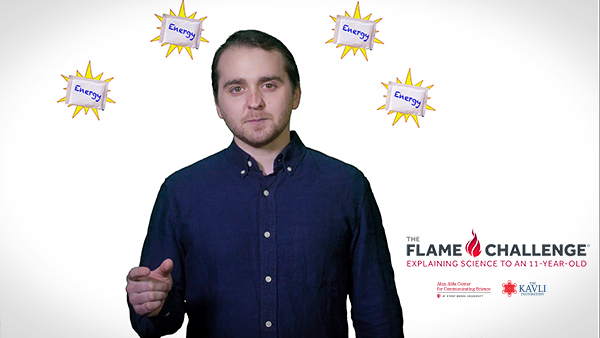
Dillion Fox, Ph.D. student in the Department of Physics and Astronomy (Video of Fox's Flame Challenge entry follows the Q&A portion of the article)
Thursday, February 9, 2017
By Susan Ahlborn
The Flame Challenge asks scientists around the world to explain a basic concept in a way that can be understood by an 11-year-old; a team of fifth graders judges the entries. Penn Ph.D. candidate Dillion Fox took on this year’s challenge, to answer the question “What is energy?” We asked him about his own path to science and his commitment to outreach. View Fox's Flame Challenge entry here. It can also be found at the bottom of the article.
Susan Ahlborn: How did you get involved with the Flame Challenge?
Dillion Fox: The goal of the 'Flame Challenge' is to get scientists to be more engaged in outreach and come up with new ways of explaining really basic concepts in science to people that don't think about science regularly. I'm genuinely excited by science, and I like talking about it, especially when people want to listen.
SA: How did you get interested in science yourself?
DF: I don’t know if I should say this, but at first I was largely uninterested in school. But I had a biology class that was pretty interesting, and then I took a physics class my senior year of high school and really liked it. I applied to colleges as an engineering major, but physics turned out to be even more interesting than I thought. Now I'm right on the interface of biology and physics.
SA: Right, you’re working with Alison Sweeney, an assistant professor of physics and astronomy who actually earned her Ph.D. in biology. What kind of projects are you doing?
DF: I do molecular simulations on a computer. I think it's really cool that you can take a small biological system, or a chemical system, and just by knowing the physics of atomic interactions, you can simulate biological processes. When you calculate the forces between each atom, it figures out how the atoms want to go, and you see a whole system of a million atoms that evolves accurately in time, just as it would in biology.
SA: What do you learn from these?
DF: The models can help reinforce or change our hypotheses of how things will work. For example, we had a hypothesis that a protein interacts with a membrane, and then we were able to figure out at much finer detail exactly how and why they interact.
SA: What fascinates you about this?
DF: We think of living things as being so different from things that are not living, but there's nothing that's alive when you look closely enough at the biology. Proteins interacting with other proteins—it's biology, but the proteins aren't smart. They're just atoms that interact in a certain way, and that gives you the collective behavior of biology. One of the unifying ideas of Alison's group is that the coolest examples of soft-matter physics are found in biology. Nature has optimized these molecular interactions in such a way that they can do things that we otherwise wouldn't be able to engineer ourselves.
SA: What do you want to do eventually?
DF: I really like modeling. I could see myself either staying in academia or doing biomolecular simulations for some kind of biomed company or pharmaceutical company.
SA: Why is outreach so important to you?
DF: I think the relationship between scientists and the public is not always very strong, partly because of movies and other entertainment that give people really grand expectations for what science is supposed to be able to do. Every time someone finds out I'm a grad student in physics, they ask me which person I am in The Big Bang Theory. I think all those things are good because they get people thinking more about science, but it also leads people to believe that science should be better than it is.
I think it's part of our job as scientists to communicate effectively with the public, and show that science doesn't have to be a tremendous burden to learn or understand—that it can be accessible to people. I try hard to be able to talk about science with just anyone, especially kids because they're usually more interested than other people. I try to be able to communicate in ways that are interesting and understandable.
Watch Fox's Flame Challenge entry: